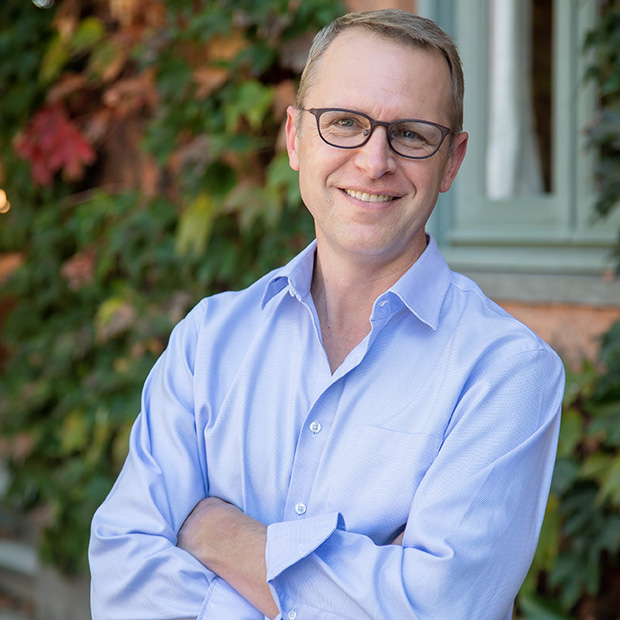The long and win(e)ding road
January 26, 2023 — For all the hours that Peter Willmert ’93 as a student spent driving Rosenfield Program dignitaries back and forth between Grinnell and the Des Moines Airport, the roadside sign that has arguably impacted his life the most was not, as you might expect, somewhere along Interstate 80.
It was along the Great Ocean Road, between Melbourne and Adelaide, in southern Australia.
 Peter Willmert ’93
Peter Willmert ’93
“Toward the end of that road, there’s this little sign that says Coonawarra with a wine glass on it,” Willmert says. “At the time, I didn’t know what Coonawarra was or that it’s one of the great wine regions of Australia. We stumbled into this little place in our rental car and knocked on the cellar doors of these wineries – who were more than happy to give us a free taste of these wines. Wine ended up becoming something that we drank pretty regularly during the rest of that semester abroad.”
Willmert’s trek along the “wine road” since then has been an indirect path to Napa Valley in California. Perhaps unsurprisingly for a student highly involved in the Rosenfield Program in Public Affairs, International Relations, and Human Rights, Willmert marched out to Washington D.C. right after graduating from Grinnell.
Many hours at the Writing Lab and Burling Library pouring over foreign affairs and policy periodicals, combined with writing for the Grinnell Underground Magazine and an internship at Mother Jones, helped Willmert secure a job as a communications staffer for two progressive champions of the late 20th century, Paul Wellstone (D-Minnesota) and Tom Harkin (D-Iowa). In 1996, he moved back to Iowa to run communications for the Iowa Democratic Party’s coordinated campaign and President Bill Clinton’s campaign in Iowa.
Following the presidential campaign, he and his now wife, Marlo Cohen, took an extended sabbatical teaching English in the Pyrenees, between Spain and France. What had first been inspired in Coonawara took hold again.
“We spent a lot of time driving around in an old beater of a Peugeot to wineries and enjoying these beautiful, bucolic areas of Spain and France, even the wine regions of Germany and Italy,” he says. “I fell very much in love with it. I had no idea I was going to work in wine, but the sabbatical year planted a seed in my brain ‘maybe this is something that could be thrilling.’”
Upon returning to the U.S., Willmert realized he wasn’t interested in continuing the campaign life and contended with the challenge of finding it more difficult to get out of politics than to stay in it. He decided to pursue a master’s in business administration at Northwestern University’s Kellogg Business School. Even as he saw major wine companies recruiting in the hallways of Kellogg, professors encouraged him to not be so quick to specialize. Their advice was to go and work for a “nuts and bolts” company for a few years.
The MBA and a stint at Johnson & Johnson “gave me a foundation across disciplines,” Willmert says. “It gave me a foundation to build upon, which is how I think about Grinnell, too.”
That foundation led their family to Napa Valley in the mid-2000s. After working at wineries and companies, both big and small in the valley, Willmert took over as CEO of Hudson Ranch and Vineyards in 2021. Founded by Lee and Cristina Hudson, the company is deeply tied to the rise of the Slow Food movement and began growing grapes for wines that are now regarded as some of the greatest wines in the world. Hudson is comprised of a working farm and ranch, a general store in Napa, grapes they grow for Hudson wines, and grapes they continue to grow for other wineries.
“We manage all of that in a way which, hopefully, is thoughtful, sustainable, and in the pursuit of excellence,” he says. “When you think about wine, and how it's different from so many other things you might consume, wine connects people to a place and a time in a way that very few other things do.”
Wine drinkers “love that it’s complicated,” he says. “They love that it's so multifaceted. They love that they can drink a different one every night for the rest of their lives if they want, or they can discover a few wines that they love and go back to them again and again and again. Wine connects them to a place that they’ve been, a moment when they were with family or friends; it can connect them to a memory, and I love everything about what that means.”
— by Joe Engleman ’14